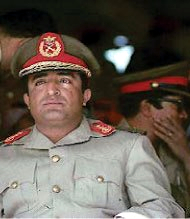This article relies largely or entirely on a single source. (January 2024) |
This article may require cleanup to meet Wikipedia's quality standards. The specific problem is: capitalization, grammar, letter-spacing, and punctuation. (April 2015) |
Ibrahim al-Hamdi | |
|---|---|
إبراهيم الحمدي, | |
 Al-Hamdi in 1976 | |
| 3rd President of North Yemen | |
| In office 13 June 1974 – 11 October 1977 | |
| Prime Minister | Mohsin Ahmad al-Aini Abdul Latif Dayfallah (Acting) Abdul Aziz Abdul Ghani |
| Preceded by | Abdul Rahman al-Iryani |
| Succeeded by | Ahmad al-Ghashmi |
| Deputy Prime Minister for Internal Affairs | |
| In office 1972–1974 | |
| President | Abdul Rahman al-Iryani |
| Prime Minister | Kadhi Abdullah al-Hagri Hassan Muhammad Makki |
| Personal details | |
| Born | 30 September 1943 Qa'atabah District, North Yemen |
| Died | 11 October 1977 (aged 34) Sana'a, North Yemen |
| Manner of death | Assassination |
| Political party | None (Military) |
| Military service | |
| Allegiance | (1956–1962) (1962–1977) |
| Branch/service | |
| Years of service | 1956–1977 |
| Rank | |
| Battles/wars | |
Ibrahim al-Hamdi (30 September 1943 – 11 October 1977) (Arabic: إبراهيم الحمدي, romanized: Ibrāhīm al-Ḥamdī) was a Yemeni military officer who served as the third President of the Yemen Arab Republic (North Yemen) from 13 June 1974 until his assassination on 11 October 1977. During his rule, he cemented the central government's control over the country, and planned to end tribal loyalty and Yemen's medieval social classes by proclaiming all Yemenis as equal.